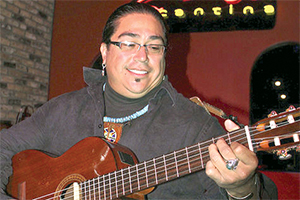By ELLEN FUTTERMAN

Gustavo Rodriguez
Austin musician Gustavo Rodriguez lost his health insurance when he got laid off from his "day job" as a youth advocacy caseworker in 2008. Playing weekend gigs and finding occasional work as a hotel clerk or day laborer brought in some income, but not nearly enough for Rodriguez to afford health insurance.
"In a good year, I make around $17,000," says Rodriguez, who fronts the Gustavo Rodriguez Band, which plays "Spanglish Tejano World Beat" music.
A year or so after losing his caseworker job, Rodriguez's drummer mentioned that he had signed up for membership with Health Alliance for Austin Musicians, also known as HAAM. The collaborative nonprofit brings together health providers willing to offer affordable medical care with a focus on health and wellness to low-income, uninsured Austin musicians. Rodriguez made a mental note of the organization; and, a year or so later, he too became a member. But it wasn't until a couple of years ago, when Rodriguez had a large sore that wasn't healing, that he fully realized how valuable the health care access is to local musicians. When he called for help, the alliance referred him to its medical partner, Seton Healthcare Family, where doctors determined he had Type 2 diabetes. They explained that as a result of the disease, his immune system had been compromised, and that's why the sore wasn't healing. He was put on medication and told to lose weight and start eating healthy.
"I really feel as if I owe my life to HAAM," says Rodriguez, 44. He switched to a vegan diet at the beginning of the year to help fight his diabetes.
"I don't know what I would have done without them because there is no way I can afford health insurance," he adds. "All it's cost me is $10 or $20 for a co-payment, and that includes my medication."
Hand-to-mouth life
The Health Alliance for Austin Musicians was founded in 2005, and championed by the late Robin Shivers, an Austin philanthropist. She felt passionately that the city's musicians, who contributed so much to the local economy and the city's culture, should be able to have basic health care. Shivers reached out to the leadership at Seton Healthcare Family, which was already serving the working poor in the community, and they signed on as the health alliance's primary medical care partner.
Additionally, other health care partners joined to increase services so that musicians could have access to basic dental care, mental health and addiction recovery, hearing health, vision health and nutrition counseling.

Performer Marcia Ball, a board member of the Health Alliance for Austin Musicians, says the organization saves lives by providing health care access to poor and struggling musicians. (Photo credit Adam Ziaja/Shutterstock)
"Our mission is to take care of the poor and vulnerable. Musicians, unless they are extremely successful, live hand-to-mouth a lot of the times and can't afford health care," explains Kit Abney Spelce, director of community insurance programs at Seton Healthcare Family, the leading provider of health care services in Central Texas. Seton is part of St. Louis-based Ascension Health, the largest not-for-profit health system in the U.S.
"In Austin, our slogan is 'Live Music Capital of the World,'" Abney Spelce continues. "Music is an economic driver, bringing roughly $2 billion to our economy." She said it's important to Seton as a community member to support musicians; they are an asset to the region.
Lifesaver
Reenie Collins, executive director of the Health Alliance for Austin Musicians, also notes that Seton, and the alliance's other health care partners, understand that "if they can meet the needs of musicians proactively, through wellness checkups, (musicians) are less likely to show up in emergency rooms and need the most expensive medical services."
Collins says that more than 80 percent of Austin's 9,000 working musicians make less than $17,000 a year. In order to qualify for the alliance's services, a person must live in Austin; currently be employed — or have been employed in the last year — as a musician, and earn at, or below, $29,175, equivalent to 250 percent of the federal poverty level.
"Musicians fuel the economy of Austin, they provide this wonderful service, yet most don't make a decent living, and it's not getting better," says Marcia Ball, a nationally known touring blues singer and pianist who is a board member of the Health Alliance for Austin Musicians. "People will buy a glass of wine for $10 but they won't pay a cover charge. Musicians have to cobble together a living, and as a result many can't tour and grow their business. They'll wait tables, dog sit, serve coffee, but these pursuits don't pay benefits. That's why HAAM is so crucial. It is actually saving lives."
By the end of its second year, the health alliance had 450 members. Today, it has more than 2,200 active members and has helped "nearly 4,000 musicians access 52,000 health care appointments valued at $27 million in services," says Collins, adding that every dollar the health alliance raises is leveraged into $8 of health care services to its partners. "But that is nothing to what our partners give," she adds. "The reason it works for them is that they see they are meeting the needs of the community."
The ACA in Texas
Collins says that even with the Affordable Care Act, more than 60 percent of alliance members are without credible insurance coverage. Congress intended for an adult whose income was at or below the federal poverty level — now $11,670 per year — to be covered by the ACA's Medicaid expansion. The law allowed those who earned from 100 percent to 400 percent of the poverty level to purchase premium-subsidized insurance on insurance marketplaces. When the Supreme Court gave states the option not to expand Medicaid, Texas took that option. Impoverished musicians and other people whose income was at or below the federal poverty level fell through the coverage gap in states that did not expand Medicaid.
"We already know that 60 percent of our members don't have any other options but us," says Collins. "Even those who do purchase medical coverage through the marketplace will still be able to get dental, vision and mental health care through us," says Collins.
Copyright © 2014 by the Catholic Health Association
of the United States
For reprint permission, contact Betty Crosby
or call (314) 253-3477.